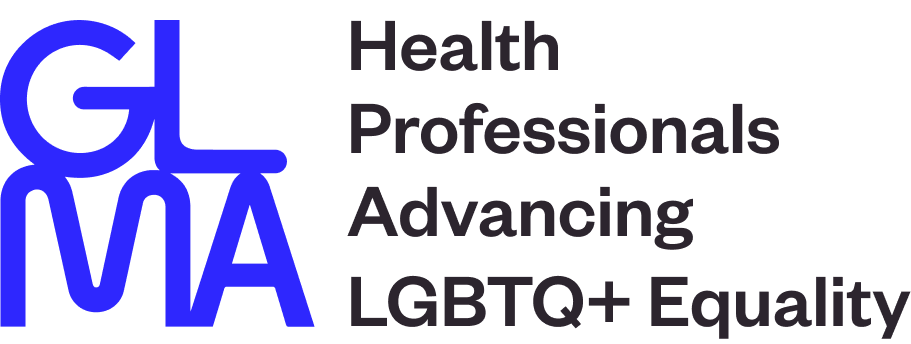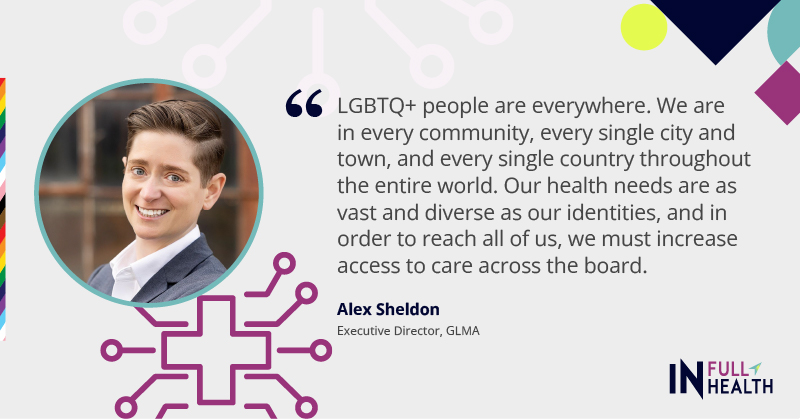
With over a decade of experience in health care advocacy and policy, Alex has been instrumental in advancing GLMA’s mission through their leadership in various programs and initiatives.
We’re discussing the importance of increased access to care and health information for the LGBTQ+ community — while also addressing the current political climate and how technology can improve access to health care for LGBTQ+ individuals.
In Full Health (IFH): What motivates your work in the LGBTQ+ health and health care space? What experiences have brought you to your position with GLMA?
Alex Sheldon: I have worked in public health for the majority of my career. I primarily have served as a researcher in policy and data analysis and am always working to ensure and increase access to care and health information for the LGBTQ+ community.
What really inspired me and motivated me to take on this leadership role was the political moment that the LGBTQ+ community is experiencing right now. I see so many parallels between the attacks on LGBTQ+ people during the onset of the HIV/AIDS crisis decades ago and the attacks on medical care for transgender people and other rights to bodily autonomy we see today. We pleaded with the government to fight for our lives then just as we are forced to do now.
IFH: During a time when LGBTQ+ health is under significant attack, as you mentioned, what message do you want to communicate to the In Full Health community?
Alex Sheldon: I think that everyone who is even remotely invested in or involved in health care should be very worried right now. I include in that the general population who seeks access to health care. What I want people first to pay attention to is the use of some of our most vulnerable community members (being trans and nonbinary young people) as political pawns by a group of people that opposes fundamental human rights for an entire community.
Further eroding access to that care is putting vulnerable people at increased risk. Even if there are folks out there who don’t understand that the care under attack is medically necessary and lifesaving care for trans youth — I think they should be very worried about the broader implications of what is happening.
There are structures in place that center scientific evidence to guide policy and decision-making. The more that we ignore evidence and ignore guidance from health care organizations like the American Medical Association, the American Academy of Pediatrics, and GLMA, the further we are eroding trust in the very institutions that are tasked with preserving our health and well-being. I want people to consider what health care provision will look like if this trend continues and political interests completely usurp medical and scientific evidence on a grand scale.
As a non-binary person myself, I feel incredibly passionate about preserving access to medically-necessary care for trans and non-binary people and I feel empowered by the membership at GLMA to make impactful change in this space. I feel deeply inspired by the legacy of impact at GLMA and I do believe we can mobilize the expertise within our membership to continue to drive change.
SUBSCRIBE
Stay in the loop about new blog posts from equitable health innovation leaders, helpful resources and tools to help you bring the Principles to life, upcoming events, and more by joining our email list.
SUBSCRIBEIFH: How can technology be leveraged to improve access to health care for LGBTQ+ individuals?
Alex Sheldon: LGBTQ+ people are everywhere. We are in every community, every single city and town, and every single country throughout the entire world. We are not a monolith. We contain so many multitudes in our identities, and in order to reach all of us, then we must increase access to care across the board.
I believe wholeheartedly in a concept called “targeted universalism,” which was introduced by Berkeley professor, john a. powell. Essentially, if we can find solutions that work for the folks who are most excluded across multiple identities, then we are going to find solutions that work for everyone.
We had this reality in mind when we teamed up with the Tegan and Sarah Foundation and Cigna to create the LGBTQ+ Healthcare Directory. So, the person we had in mind when creating this resource was a Black trans woman, living in a rural area, who hasn’t yet found medical care that affirms her identity.
We want that person to be able to go to the directory, type in their zip code, and find care that affirms all of their identities right there in one central location. To that end, you can search the directory based on the provider’s race, ethnicity, sexual orientation, gender identity, approach to care, specialties, disciplines, and even the insurance that they accept.
![]()
Expressing Gratitude
I want to express my deepest gratitude to the health professionals who have been tirelessly supporting transgender youth and their families during these challenging times. Their unwavering dedication to providing compassionate and affirming care is truly commendable. In the face of uncertainty, their commitment to the well-being of trans youth has not gone unnoticed, and the impact of their work extends far beyond health care. I also want to lift up the trans youth and their families whose resilience and strength inspire us all.
Alex Sheldon
Executive Director, GLMA
IFH: How can health solution developers or investors get involved with GLMA’s work and stay on top of trends in LGBTQ+ health?
Alex Sheldon: There are many options to get involved with GLMA and stay on top of LGBTQ+ health trends. First and foremost, you can join GLMA as a member. We have a special membership for Supporters of LGBTQ+ Health that includes tech experts, journalists, researchers, administrators, policy professionals, and many more. By joining as a Supporter, you’ll be joining a membership not only of LGBTQ+ health professionals, but of individuals from all professional backgrounds who are invested in LGBTQ+ health care, and you’ll gain access to exclusive events, research, and resources designed to advance LGBTQ+ health equity.
Second, I encourage all innovators in the space to join us for GLMA’s Annual Conference on LGBTQ+ Health. At this conference, we bring together hundreds of health professionals to learn from and engage with the people who are making that change within the industry.
This year, we are celebrating the 42nd Annual Conference on LGBTQ+ Health — which means the first conferences were held in the early 80s when the world and the political climate for LGBTQ+ people was entirely different. The very first Annual Conference brought together health professionals to center LGBTQ+ health needs at a time when those professionals couldn’t even be out of the closet without risking their careers and livelihoods. The idea that folks came together to explore health needs in that time period is so incredible to me still to this day. What is most inspiring to me is simply the legacy and bravery of this conference.
This year’s conference is building on that impressive legacy, bringing together experts in LGBTQ+ health from all across the country to rise up against attempts to restrict and ban access to affirming health care.
IFH: What other specific steps can health solution innovators take to ensure that their products and services are inclusive and culturally competent for the LGBTQ+ community?
Alex Sheldon: I think the first step is always looking around the table and seeing whose ideas, livelihoods, and lived experiences are represented in the group of people or individuals that you have brought together to create something. Having one single LGBTQ+ person in the room and expecting them to represent the entire community is a setup for both sides. That person is not going to be able to adequately represent a community as richly diverse as ours and all of our needs and interests, and that person is going to feel a lot of pressure and may feel tokenized by having been asked to do so.
The second piece is to embrace change and fluidity. If there’s anything that technology and the LGBTQ+ community have in common, it’s a propensity for evolution and expansion. We constantly have new identities, new symbols — like our gloriously evolving pride flag — and new models to share with the world. So I encourage the tech community to think of their efforts to engage and serve the LGBTQ+ community as just as deserving of innovation as their products. Building in the mechanisms for innovation and evolution is crucial to keeping up with the community and our ever-changing needs.
And lastly, always hire researchers — in particular health researchers. At GLMA we have a huge membership comprised of LGBTQ+ health professionals of all disciplines and specialties, including those doing research in their given fields. They are developing new, groundbreaking standards of care and they are learning more about our community and our health needs every single day. Bring those folks into the conversation to make sure that you’re always on the cutting edge of what is happening in the community.
SUBSCRIBE
Stay in the loop about new blog posts from equitable health innovation leaders, helpful resources and tools to help you bring the Principles to life, upcoming events, and more by joining our email list.
SUBSCRIBE


Comments are closed.